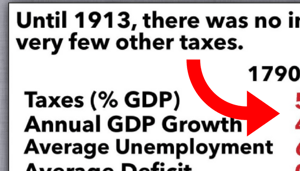
President Donald Trump is promising the biggest package of tax cuts in American history, and liberals are fear-mongering like usual about it.
What kind of arguments are the left using to tank Trump’s tax reform effort? The usual comments about the tax cuts being “for the rich” for sure. Some on the left are making the tired claim that paying taxes is part of the American Dream because the government funds essential services like schools, roads, and bridges.
Bernie Sanders argued as much in the past, stating that “If everybody in this country was a genius like Mr. Trump is and not pay any taxes, we would not have a country.” The comment came after Trump’s 1995 tax return was released by the New York Times, showing a net loss of nearly $1 billion that year on his investments, which Trump could carry over to future years. For anyone unaware of how this works, suppose you’re an investor who lost $1 million in one year, then earned $1.1 million the next year. Would it be fair to say you earned $1.1 million? Of course not, because on net, you only earned $100,000, and would thus be only taxed on the $100,000.
Carrying over tax losses is hardly a way to cheat taxes, and given that Trump’s latest tax return to leak (from 2005) shows him paying tens of millions in taxes, he’s clearly earned enough (and paid a ton in tax) where he’s no longer benefiting from prior losses. The 2005 tax return also disproves the New York Times’ claims that Trump could’ve avoided taxes for “as long as eighteen years” thanks to his 1995 loss.
But back to the meat of Bernie’s statement. Would we really “not have a country” in the absence of taxes? Nobody among us is arguing for zero taxes, but there was a lengthy part of American history where we didn’t have an income tax – and how did the economy fare?
Better, if you can believe it.

As Unbiased America‘s Kevin Ryan writes, “during that time we also invented the cotton gin, suspension bridge, fire hydrant, refrigeration, morse code, sewing machine, combine harvester, steam shovel, circuit breaker, vulcanized rubber, jackhammer, safety pin, paper clip, clothes pin, clothes hanger, dishwasher, electric stove, escalator, vacuum cleaner, repeating rifle, machine gun, torpedo, ratchet wrench, rotary printing press, motorcycle, barbed wire, paper bag, tape measure, sand blasting, grain silo, jeans, fire sprinkler, dental drill, phonograph, central heating, microphone, photographic plate, photographic film, carton, cash register, oil boiler, metal detector, electric iron, electric fan, blood pump, solar cell, thermostat, dissolvable pill, skyscraper, mixer, fuel pump, file cabinet, calculator, induction motor, drinking straw, ball point pen, pay phone, stop sign, cereal, smoke detector, tesla coil, rotary phone, zipper, bottle cap, tractor, mouse trap, surgical gloves, muffler, charcoal briquette, remote control, semi-auto shotgun, airplane, nickel-zinc battery, fly swatter, thumbtack, assembly line, safety razor, hearing aid, air conditioning, offset printing press, windshield wiper, automatic transmission, paper towel, paper shredder, headset, autopilot, electric blanket, traffic lights, and much more.”
That doesn’t sound like a bad deal to me! And it certainly doesn’t sound like we lacked a country, as Bernie Sanders would have you believe.
Share this story with others to show them the truth about the history of the income tax.
